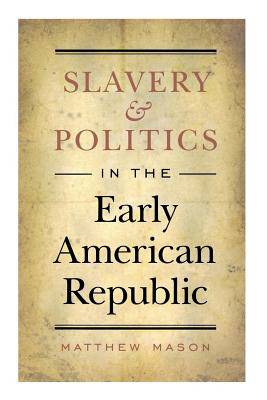
- Retrait gratuit dans votre magasin Club
- 7.000.000 titres dans notre catalogue
- Payer en toute sécurité
- Toujours un magasin près de chez vous
- Retrait gratuit dans votre magasin Club
- 7.000.0000 titres dans notre catalogue
- Payer en toute sécurité
- Toujours un magasin près de chez vous
53,95 €
+ 107 points
Description
Giving close consideration to previously neglected debates, Matthew Mason challenges the common contention that slavery held little political significance in America until the Missouri Crisis of 1819. Mason demonstrates that slavery and politics were enmeshed in the creation of the nation, and in fact there was never a time between the Revolution and the Civil War in which slavery went uncontested.
The American Revolution set in motion the split between slave states and free states, but Mason explains that the divide took on greater importance in the early nineteenth century. He examines the partisan and geopolitical uses of slavery, the conflicts between free states and their slaveholding neighbors, and the political impact of African Americans across the country.
Offering a full picture of the politics of slavery in the crucial years of the early republic, Mason demonstrates that partisans and patriots, slave and free--and not just abolitionists and advocates of slavery--should be considered important players in the politics of slavery in the United States.
Giving close consideration to previously neglected debates, Matthew Mason challenges the common contention that slavery held little political significance in America until the Missouri Crisis of 1819. Mason demonstrates that slavery and politics were enmeshed in the creation of the nation, and that in fact there was never a time between the Revolution and the Civil War in which slavery went uncontested.
Offering a full picture of the politics of slavery in the crucial years of the early republic, Mason demonstrates that partisans and patriots, slave and free--and not just abolitionists and advocates of slavery--should be considered important players in the politics of slavery in the United States.
The American Revolution set in motion the split between slave states and free states, but Mason explains that the divide took on greater importance in the early nineteenth century. He examines the partisan and geopolitical uses of slavery, the conflicts between free states and their slaveholding neighbors, and the political impact of African Americans across the country.
Offering a full picture of the politics of slavery in the crucial years of the early republic, Mason demonstrates that partisans and patriots, slave and free--and not just abolitionists and advocates of slavery--should be considered important players in the politics of slavery in the United States.
Giving close consideration to previously neglected debates, Matthew Mason challenges the common contention that slavery held little political significance in America until the Missouri Crisis of 1819. Mason demonstrates that slavery and politics were enmeshed in the creation of the nation, and that in fact there was never a time between the Revolution and the Civil War in which slavery went uncontested.
Offering a full picture of the politics of slavery in the crucial years of the early republic, Mason demonstrates that partisans and patriots, slave and free--and not just abolitionists and advocates of slavery--should be considered important players in the politics of slavery in the United States.
Spécifications
Parties prenantes
- Auteur(s) :
- Editeur:
Contenu
- Nombre de pages :
- 352
- Langue:
- Anglais
Caractéristiques
- EAN:
- 9780807859230
- Date de parution :
- 01-09-08
- Format:
- Livre broché
- Format numérique:
- Trade paperback (VS)
- Dimensions :
- 229 mm x 155 mm
- Poids :
- 498 g

Les avis
Nous publions uniquement les avis qui respectent les conditions requises. Consultez nos conditions pour les avis.






